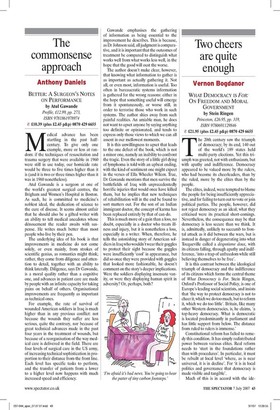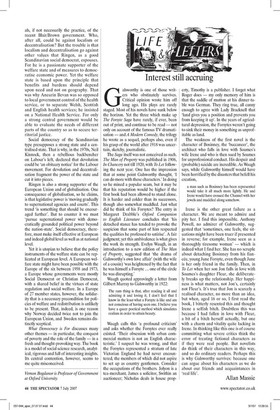Two cheers are quite enough
Vernon Bogdanor WHAT DEMOCRACY IS FOR: ON FREEDOM AND MORAL GOVERNMENT by Stein Ringen Princeton, £26.95, pp. 319, ISBN 9780691129846 £21.95 (plus £2.45 p&p) 0870 429 6655 The 20th century saw the triumph of democracy; by its end, 140 out of the world's 189 states held multi-party elections. Yet this triumph was greeted, not with enthusiasm, but with apathy and indifference. Democracy appeared to be valued more by the rulers, who had become its cheerleaders, than by the ruled, more by the elites than by the people.
The elites, indeed, were tempted to blame the people for being insufficiently appreciative, and for failing to turn out to vote or join political parties. The people, however, did not reject democracy as an ideal; what they criticised were its practical short-comings. Nevertheless, the consequence may be that democracy is less secure than we think. It is, admittedly, unlikely to succumb to frontal attack as it did between the wars, but is instead in danger of degenerating into what Tocqueville called a despotisme clotoc, with its citizens falling, through apathy and indifference, 'into a trap of unfreedom while still believing themselves to be free'.
It is this contrast between the ideological triumph of democracy and the indifference of its citizens which forms the central theme of What Democracy is For. Stein Ringen, Oxford's Professor of Social Policy, is one of Europe's leading social scientists, and insists that `the way to protect democracy is not to cheer it, which we do too much, but to reform it, which we do too little'. Britain, like many other Western democracies, is, he claims, 'a top-heavy democracy. What is democratic is located predominantly in parliament and has little support from below. The distance from ruled to rulers is immense.'
Constitutional reform has failed to remedy this condition. It has simply redistributed power between various elites. Real reform needs to 'start in the foundations rather than with procedures'. In particular, it must be rebuilt at local level 'where, as is near universal, it is in decline'. For 'it is in local politics and governance that democracy is made visible and tangible'.
Much of this is in accord with the ideals, if not necessarily the practice, of the recent Blair/Brown government. Who, after all, could be against localism or decentralisation? But the trouble is that localism and decentralisation go against other values that Ringen, as a good Scandinavian social democrat, espouses. For he is a passionate supporter of the welfare state and of measures to democratise economic power. Yet the welfare state is based upon the principle that benefits and burdens should depend upon need and not on geography. That was why Aneurin Bevan was so opposed to local government control of the health service, or to separate Welsh, Scottish and English health services; he insisted on a National Health Service. For only a strong central government would be able to evaluate the needs of different parts of the country so as to secure territorial justice.
Social democracy of the Scandinavian type presupposes a strong state and a centralised state. That is why, in the 1970s, Neil Kinnock, then a rebellious backbencher on Labour's left, declared that devolution could be 'an obituary notice' for the Labour movement. For devolution and decentralisation fragment the power of the state and cut it into pieces.
Ringen is also a strong supporter of the European Union and of globalisation. One consequence of globalisation, so he claims, is that legislative power is 'moving gradually to supernational agencies and courts'. This trend 'is something that should be encouraged further'. But to counter it we must 'pursue supernational power with democratically grounded political power beyond the nation-state'. Social democracy, therefore, must make itself effective at European and indeed global level as well as at national level.
Yet it is utopian to believe that the policy instruments of the welfare state can be replicated at European level. A European welfare state might have been possible with the Europe of the six between 1958 and 1973, a Europe whose governments were mostly Social Democrat or Christian Democrat, with a shared belief in the virtues of state regulation and social welfare. In a Europe of 27 member states, however, the solidarity that is a necessary precondition for policies of welfare and redistribution is unlikely to be present. That, indeed, is one reason why Norway decided twice not to join the European Union, and Sweden remains distinctly sceptical.
What Democracy is For discusses many other themes — in particular, the conquest of poverty and the role of the family — in a fresh and thought-provoking way. The book is a model of social science research, analytical, rigorous and full of interesting insights. Its central contention, however, seems to me quite misconceived.
Vernon Bogdanor is Professor of Government at Oxford University.




















































 Previous page
Previous page